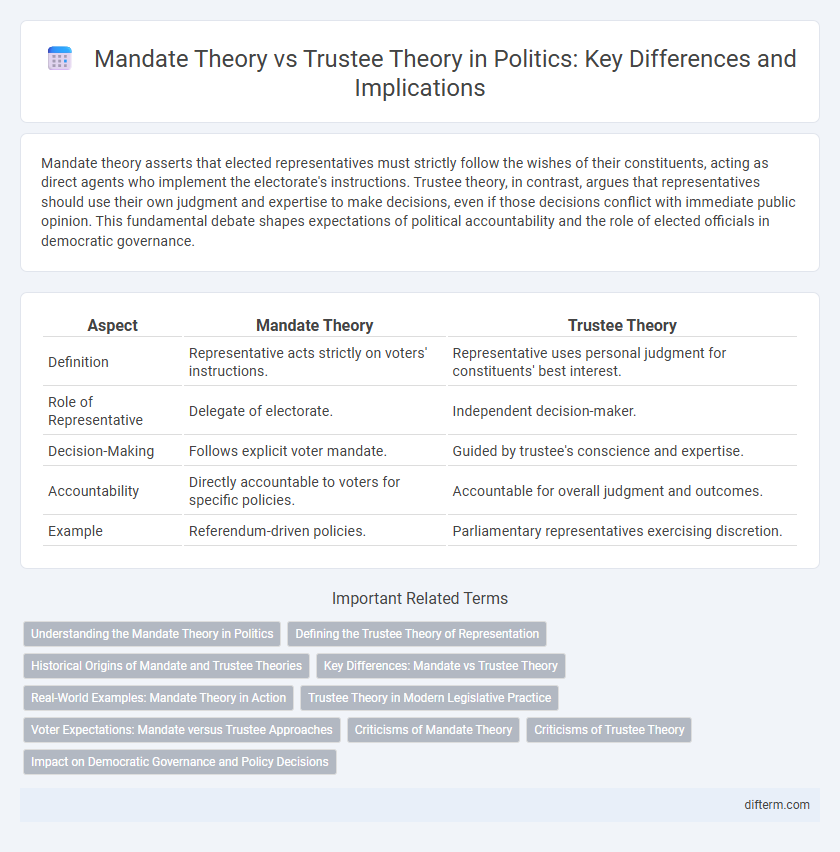Mandate theory asserts that elected representatives must strictly follow the wishes of their constituents, acting as direct agents who implement the electorate's instructions. Trustee theory, in contrast, argues that representatives should use their own judgment and expertise to make decisions, even if those decisions conflict with immediate public opinion. This fundamental debate shapes expectations of political accountability and the role of elected officials in democratic governance.
Table of Comparison
| Aspect | Mandate Theory | Trustee Theory |
|---|---|---|
| Definition | Representative acts strictly on voters' instructions. | Representative uses personal judgment for constituents' best interest. |
| Role of Representative | Delegate of electorate. | Independent decision-maker. |
| Decision-Making | Follows explicit voter mandate. | Guided by trustee's conscience and expertise. |
| Accountability | Directly accountable to voters for specific policies. | Accountable for overall judgment and outcomes. |
| Example | Referendum-driven policies. | Parliamentary representatives exercising discretion. |
Understanding the Mandate Theory in Politics
Mandate theory in politics asserts that elected representatives have a direct obligation to enact policies based on their campaign promises, reflecting the explicit wishes of their electorate. This theory emphasizes the role of voter consent as a political mandate that legitimizes the authority of politicians to implement specific agendas. Understanding mandate theory highlights the democratic principle of accountability, where elected officials are expected to fulfill commitments rather than exercise independent judgment.
Defining the Trustee Theory of Representation
The Trustee Theory of Representation asserts that elected officials should act based on their own judgment and expertise, rather than simply following the direct wishes of their constituents. This theory emphasizes the representative's responsibility to make informed decisions that serve the long-term interests of the public, even if those decisions are unpopular in the short term. It contrasts with the Mandate Theory, where representatives are viewed as delegates obligated to carry out the explicit desires of their voters.
Historical Origins of Mandate and Trustee Theories
Mandate theory originated in the early 20th century as a response to democratic demands, emphasizing elected representatives' obligation to act strictly according to their constituents' wishes. Trustee theory has roots in 19th-century political philosophy, notably advanced by Edmund Burke, advocating that representatives use their own judgment to make decisions for the public good. These contrasting theories emerged from evolving ideas about representation and accountability in parliamentary democracies.
Key Differences: Mandate vs Trustee Theory
Mandate theory emphasizes representatives acting strictly according to their constituents' expressed wishes, reflecting direct electoral mandates. Trustee theory grants representatives the discretion to use their judgment and expertise to make decisions they believe serve the long-term interests of their constituents. The key difference lies in whether elected officials prioritize voter directives (mandate) or autonomous decision-making (trustee).
Real-World Examples: Mandate Theory in Action
Mandate theory is exemplified by politicians strictly adhering to their election platforms, as seen in Margaret Thatcher's implementation of neoliberal policies following the Conservative Party's 1979 victory. This approach ensures elected representatives act as direct agents of voter preferences, reflecting public mandates on issues like tax reform and privatization. In contrast, mandate theory emphasizes accountability by aligning legislative actions closely with explicit electoral promises.
Trustee Theory in Modern Legislative Practice
Trustee theory in modern legislative practice empowers elected officials to use their own judgment and expertise to make decisions that serve the long-term interests of their constituents and the nation. Legislators guided by trustee principles prioritize informed deliberation over direct voter control, often consulting expert advice and ethical considerations to navigate complex policy issues. This approach fosters responsible governance, balancing accountability with the need for nuanced, independent decision-making in contemporary political systems.
Voter Expectations: Mandate versus Trustee Approaches
Voter expectations differ markedly between mandate theory and trustee theory in politics. Under mandate theory, elected officials are expected to strictly follow the policy preferences expressed by their constituents during elections, acting as direct agents of voter will. Trustee theory emphasizes representatives' autonomy to use their own judgment and expertise to make decisions they believe serve the public interest, even if it conflicts with immediate voter demands.
Criticisms of Mandate Theory
Mandate theory faces criticism for oversimplifying voter preferences by assuming elected officials must strictly follow their campaign promises without considering changing circumstances. Critics argue this approach limits political judgment and flexibility, reducing representatives to mere delegates rather than independent decision-makers. This rigid interpretation can undermine effective governance by prioritizing electoral mandates over nuanced policy considerations.
Criticisms of Trustee Theory
Trustee theory faces criticism for concentrating power in representatives who may prioritize personal judgment over constituents' wishes, potentially undermining democratic accountability. Critics argue this approach risks detachment from voter preferences, leading to decisions that do not reflect the electorate's immediate interests. Empirical studies reveal that excessive reliance on trustees can foster political elitism and reduce public trust in democratic institutions.
Impact on Democratic Governance and Policy Decisions
Mandate theory emphasizes elected representatives acting strictly according to voter instructions, strengthening direct democratic accountability but potentially limiting flexibility in complex policy decisions. Trustee theory grants politicians the autonomy to use personal judgment, which can enhance informed decision-making and long-term governance effectiveness despite occasional public dissent. The balance between these theories shapes the responsiveness and stability of democratic institutions, influencing how policies align with constituent preferences and expert assessments.
mandate theory vs trustee theory Infographic

 difterm.com
difterm.com